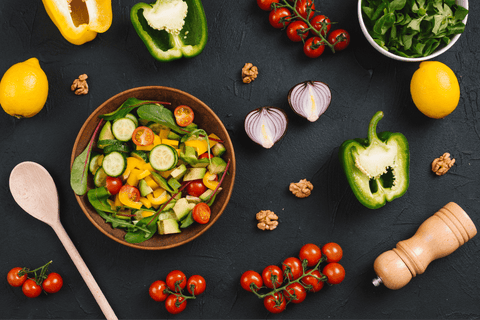What Are the Health Benefits of Quercetin?

Key Takeaways
- Health Benefits of Quercetin: Quercetin reduces inflammation, fights allergies, lowers blood pressure, and supports brain and heart health.
- Who Should Avoid Quercetin: Avoid if pregnant, breastfeeding, have kidney issues, or take blood thinners due to potential risks.
- Best Combinations with Quercetin: Combine quercetin with zinc for better immunity and with bromelain for enhanced anti-inflammatory effects.
What is Quercetin?
Quercetin is a natural flavonoid in apples, onions, berries, and tea. It acts as a powerful antioxidant, neutralizing free radicals and potentially preventing chronic diseases. Its anti-inflammatory, antiviral, and antihistamine effects make it a popular choice for natural health remedies.
Health Benefits of Quercetin

Quercetin offers several health benefits, making it a versatile supplement. Here are its key benefits:
May Reduce Inflammation
- Quercetin has powerful anti-inflammatory properties that can help reduce inflammation in the body.
- It inhibits the production of inflammatory molecules like prostaglandins and leukotrienes.
- This is especially helpful for those suffering from chronic inflammatory conditions, like arthritis or inflammatory bowel disease.
May Ease Allergy Symptoms
- Quercetin is a natural antihistamine, which can help reduce allergy symptoms such as sneezing, itching, and watery eyes.
- It stabilizes mast cells, which release histamine during allergic reactions.
- Studies suggest quercetin may be effective for seasonal allergies and asthma.
May Have Anticancer Effects
- Some studies indicate that quercetin may help inhibit the growth of cancer cells.
- It induces apoptosis (cell death) in cancerous cells while leaving healthy cells unharmed.
- Quercetin's antioxidant properties may also prevent DNA damage that can lead to cancer.
May Reduce the Risk of Long-Term Brain Disorders
- Research suggests quercetin may protect brain cells from oxidative stress, potentially lowering the risk of neurodegenerative diseases like Alzheimer's and Parkinson's.
- It enhances mitochondrial function, which is crucial for brain health and cognitive function.
- Quercetin's anti-inflammatory effects may also contribute to reduced risk of chronic brain disorders.
May Reduce Blood Pressure
- Quercetin may help lower blood pressure by improving endothelial function and reducing oxidative stress.
- Studies have shown that quercetin supplementation can reduce both systolic and diastolic blood pressure in individuals with hypertension.
- It may also improve overall cardiovascular health by preventing the oxidation of LDL cholesterol.
Other Potential Benefits
- Antioxidant Properties: Quercetin scavenges free radicals, helping to prevent cellular damage and oxidative stress.
- Immune System Support: It may boost the immune system by enhancing the body's ability to fight off infections.
- Anti-Aging Effects: Quercetin’s ability to protect cells from damage may contribute to anti-aging benefits.
Food Sources and Dosage of Quercetin

Quercetin can be obtained from various natural food sources. Some of the richest sources include:
- Fruits: Apples, berries, citrus fruits, and cherries.
- Vegetables: Onions, kale, broccoli, and spinach.
- Grains: Buckwheat and quinoa.
- Beverages: Green tea and red wine.
Dosage Guidelines:
- The typical dosage of quercetin supplements ranges from 500 mg to 1,000 mg per day, depending on individual health needs and goals.
- It's recommended to start with a lower dose and gradually increase to avoid potential side effects.
Quercetin Supplements
- Quercetin supplements come in different forms, such as capsules, tablets, and powders.
- Some supplements are combined with other ingredients, such as vitamin C, to enhance absorption.
- When choosing a supplement, consider factors like dosage, additional ingredients, and product quality.
Safety and Side Effects of Quercetin
- Quercetin is generally considered safe for most people when taken at recommended dosages.
- Possible side effects may include headaches, stomach upset, or tingling sensations.
- High doses or long-term use may increase the risk of kidney damage, so it's essential to follow dosage recommendations.
Who Should Not Take Quercetin?
Certain individuals should avoid quercetin supplementation, including:
- Pregnant or breastfeeding women, due to a lack of safety data.
- For individuals with kidney disease, as high doses may exacerbate kidney problems.
- Those taking medications like blood thinners or antihypertensive drugs, as quercetin may interact with these medications.
Quercetin Benefits for Skin
- Quercetin's antioxidant properties help protect the skin from oxidative damage caused by environmental stressors, such as UV radiation and pollution.
- It may reduce skin inflammation and redness, promoting a clearer complexion.
- Quercetin is also known to enhance skin hydration and elasticity, contributing to healthier, younger-looking skin.
Quercetin and Zinc Benefits
- Combining quercetin with zinc can enhance immune support, particularly in reducing the severity and duration of colds and respiratory infections.
- Zinc helps improve quercetin absorption, maximizing its health benefits.
- This combination is popular in immune-boosting supplements.
Quercetin with Bromelain Benefits
- Bromelain, an enzyme found in pineapples, is often paired with quercetin to enhance its anti-inflammatory effects.
- This combination is particularly effective for reducing inflammation and easing allergy symptoms.
- Bromelain may also improve the absorption of quercetin, making it more effective.
How Quickly Does Quercetin Show Results?
- The timeframe for experiencing the benefits of quercetin can vary depending on the individual's health status and the specific benefit sought.
- Some people may notice improvements in allergy symptoms within a few days, while others may take several weeks to see changes in inflammation or blood pressure.
- Consistent use is key to achieving optimal results with quercetin supplementation.
FAQ’s
What does quercetin do to your body?
Quercetin reduces inflammation, boosts immunity, and protects against allergies, heart disease, and certain cancers.
Is it safe to take quercetin daily?
Yes, quercetin is safe for daily use at recommended doses. Consult your doctor first.
Is quercetin anti-aging?
Yes, quercetin fights oxidative stress and protects skin, helping reduce signs of aging.
Does quercetin affect sleep?
No, quercetin does not impact sleep quality.
Should quercetin be taken in the morning or at night?
Take quercetin in the morning or with meals for better absorption.
Conclusion
In conclusion, quercetin is a powerful antioxidant with a wide range of health benefits, from reducing inflammation and easing allergies to supporting heart and brain health. Adding quercetin to your daily routine could enhance your overall well-being. Ready to experience these benefits for yourself? Explore our high-quality quercetin supplements at Just Glow to start your journey to better health today. Check out our website to discover more and choose the ideal product for you!
Summary
Quercetin, a potent antioxidant in fruits, vegetables, and grains, is known for its health benefits, including reducing inflammation and boosting immunity. This article covers quercetin's benefits, sources, dosage, safety, and its role in enhancing well-being.

 コンテンツにスキップ
コンテンツにスキップ





